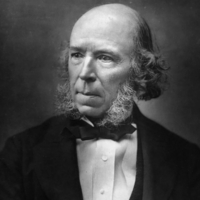Herbert Spencer
Born
in Derbyshire, England, The United Kingdom
April 27, 1820
Died
December 08, 1903
Website
Genre
Influences

|
The Man Versus the State: With Six Essays on Government, Society, and Freedom
—
published
1884
—
155 editions
|
|

|
The Philosophy Of Style
—
published
1852
—
2 editions
|
|

|
The Right To Ignore The State
—
published
1993
|
|

|
First Principles
—
published
1862
—
407 editions
|
|

|
Social Statics or The Conditions Essential to Human Happiness Specified and the First of Them Developed
—
published
1851
—
120 editions
|
|

|
Essays on Education and Kindred Subjects
—
published
1911
—
60 editions
|
|

|
The Complete Works of Herbert Spencer: The Principles of Psychology, The Principles of Philosophy, First Principles and More (6 Books With Active Table of Contents)
by
—
published
2011
|
|

|
Political Writings
by
—
published
1993
—
6 editions
|
|

|
Essays: Scientific, Political and Speculative, Vol 1
—
published
2006
—
46 editions
|
|

|
The Study of Sociology
—
published
1873
—
155 editions
|
|
“The ultimate result of shielding men from the effects of folly is to fill the world with fools.”
―
―
“[L]et us not overlook the further great fact, that not only does science underlie sculpture, painting, music, poetry, but that science is itself poetic. The current opinion that science and poetry are opposed is a delusion. ... On the contrary science opens up realms of poetry where to the unscientific all is a blank. Those engaged in scientific researches constantly show us that they realize not less vividly, but more vividly, than others, the poetry of their subjects. Whoever will dip into Hugh Miller's works on geology, or read Mr. Lewes's “Seaside Studies,” will perceive that science excites poetry rather than extinguishes it. And whoever will contemplate the life of Goethe will see that the poet and the man of science can co-exist in equal activity. Is it not, indeed, an absurd and almost a sacrilegious belief that the more a man studies Nature the less he reveres it? Think you that a drop of water, which to the vulgar eye is but a drop of water, loses anything in the eye of the physicist who knows that its elements are held together by a force which, if suddenly liberated, would produce a flash of lightning? Think you that what is carelessly looked upon by the uninitiated as a mere snow-flake, does not suggest higher associations to one who has seen through a microscope the wondrously varied and elegant forms of snow-crystals? Think you that the rounded rock marked with parallel scratches calls up as much poetry in an ignorant mind as in the mind of a geologist, who knows that over this rock a glacier slid a million years ago? The truth is, that those who have never entered upon scientific pursuits know not a tithe of the poetry by which they are surrounded. Whoever has not in youth collected plants and insects, knows not half the halo of interest which lanes and hedge-rows can assume. Whoever has not sought for fossils, has little idea of the poetical associations that surround the places where imbedded treasures were found. Whoever at the seaside has not had a microscope and aquarium, has yet to learn what the highest pleasures of the seaside are. Sad, indeed, is it to see how men occupy themselves with trivialities, and are indifferent to the grandest phenomena—care not to understand the architecture of the universe, but are deeply interested in some contemptible controversy about the intrigues of Mary Queen of Scots!—are learnedly critical over a Greek ode, and pass by without a glance that grand epic... upon the strata of the Earth!”
―
―
Topics Mentioning This Author
| topics | posts | views | last activity | |
|---|---|---|---|---|
| The History Book ...: 9. THE METAPHYSICAL CLUB ~ August 19th - August 25th ~~ Part Three - Chapter Nine ~ (201- 234) ~ The Metaphysical Club ~No-Spoilers, please | 56 | 55 | Sep 20, 2013 04:55PM | |
| The History Book ...: * WE ARE OPEN - PHILOSOPHY AND POLITICS ~ BIBLIOGRAPHY~ On Politics: A History of Political Thought from Herodotus to the Present (Spoiler Thread) | 29 | 199 | Mar 01, 2015 02:32PM | |
Goodreads Librari...:
 Large Print III
Large Print III
|
976 | 687 | Sep 14, 2021 12:58PM |
































